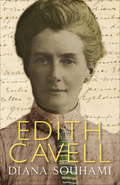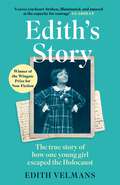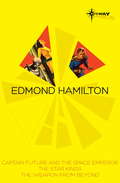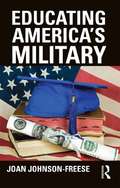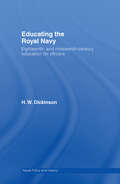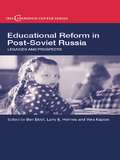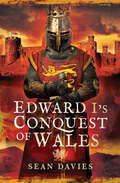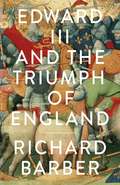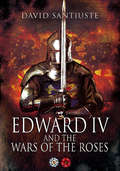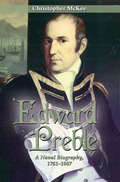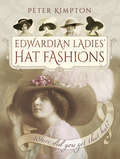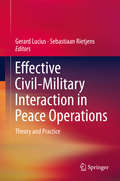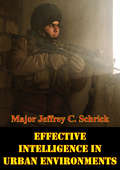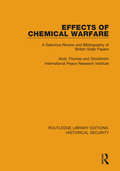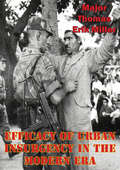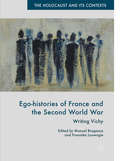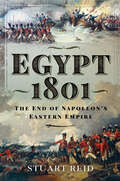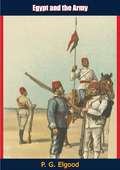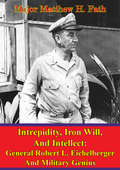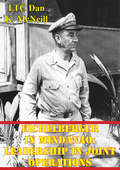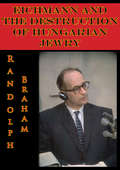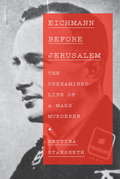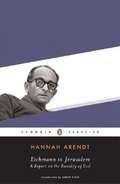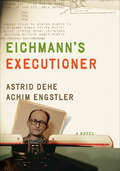- Table View
- List View
Edith Cavell: Nurse, Martyr, Heroine
by Diana SouhamiEdith Cavell was born in 1865, daughter of a Norfolk vicar, and shot in Brussels on 12 October 1915 by the Germans for sheltering British and French soldiers and helping them escape over the Belgian border. Following a traditional village childhood in 19th century England, Edith worked as a governess in the UK and abroad, before training as a nurse in London in 1895. To Edith, nursing was a duty, a vocation, but above all a service. By 1907, she had travelled most of Europe and become matron of her own hospital in Belgium, where, under her leadership, a ramshackle hospital with few staff and little organization became a model nursing school. When war broke out, Edith helped soldiers to escape the war by giving them jobs in her hospital, finding clothing and organizing safe passage into Holland. In all, she assisted over two hundred men. When her secret work was discovered, Edith was put on trial and sentenced to death by firing squad. She uttered only 130 words in her defence. A devout Christian, the evening before her death, she asked to be remembered as a nurse, not a hero or a martyr, and prayed to be fit for heaven. When news of Edith's death reached Britain, army recruitment doubled. Diana Souhami brings one of the Great War's finest heroes to life in this biography of a hardworking, courageous and independent woman.
Edith Cavell: Nurse, Martyr, Heroine
by Diana SouhamiEdith Cavell was born in 1865, daughter of a Norfolk vicar, and shot in Brussels on 12 October 1915 by the Germans for sheltering British and French soldiers and helping them escape over the Belgian border. Following a traditional village childhood in 19th century England, Edith worked as a governess in the UK and abroad, before training as a nurse in London in 1895. To Edith, nursing was a duty, a vocation, but above all a service. By 1907, she had travelled most of Europe and become matron of her own hospital in Belgium, where, under her leadership, a ramshackle hospital with few staff and little organization became a model nursing school. When war broke out, Edith helped soldiers to escape the war by giving them jobs in her hospital, finding clothing and organizing safe passage into Holland. In all, she assisted over two hundred men. When her secret work was discovered, Edith was put on trial and sentenced to death by firing squad. She uttered only 130 words in her defence. A devout Christian, the evening before her death, she asked to be remembered as a nurse, not a hero or a martyr, and prayed to be fit for heaven. When news of Edith's death reached Britain, army recruitment doubled. Diana Souhami brings one of the Great War's finest heroes to life in this biography of a hardworking, courageous and independent woman.
Edith's Story: The true story of how one young girl escaped the Holocaust (Virago Modern Classics #822)
by Edith VelmansTHE EXTRAORDINARY TRUE STORY OF HOW ONE YOUNG GIRL ESCAPED THE HOLOCAUST'It holds you with the same intensity as The Diary of Anne Frank and leaves you heart-broken, illuminated, and amazed at the capacity for courage' GUARDIAN***'I never realised that there could be such suffering in the world, and that anyone could live through it' - from Edith's diary, 1st July 1945After Germany occupied the Netherlands in 1940, fourteen-year-old Edith was still filling her diary with carefree stories of school, parties and boys. But her entries soon record a darkening world. By 1942, as the Nazis escalated their persecution of the Jewish population, Edith began a bitter struggle to survive.Hidden in plain sight but a courageous Christian family, with a German officer billeted in the next room, Edith faced the horrors of war under constant threat of discovery and betrayal. Weaving together Edith's diaries with letters smuggled between family members and her own memories, this extraordinary memoir of 'the Anne Frank who lived' is a profoundly moving account of grief, loss, courage - and one girl's remarkable belief in humanity in the face of despair.WITH A NEW INTRODUCTION BY ESTHER FREUD 'One of the best and most moving memoirs I have ever read' RUTH RENDELL'It's impossible to get through this inspiring and great-hearted volume dry-eyed' WASHINGTON POST'Both memoir and meditation, it is moving and wise . . . neither sanguine nor sentimental about the Holocaust and man's capacity for evil' LINDA HOLT, INDEPENDENT'Truly moving . . . leaving one with great hope in humanity' THE TIMESA VIRAGO MODERN CLASSIC
Edmond Hamilton SF Gateway Omnibus: Captain Future and the Space Emperor, The Star Kings & The Weapon From Beyond
by Edmond HamiltonHamilton was one of space opera's early influencers, alongside 'Doc' Smith and Jack Williamson, and also spent some time at DC Comics, where he wrote such seminal titles as Superman and The Legion of Superheroes. This omnibus contains the opening volumes to three of his best loved series: Captain Future and the Space Emperor, The Star Kings and The Weapon From Beyond.
Educating America's Military (Cass Military Studies)
by Joan Johnson-FreeseThis book offers a detailed examination of the professional military education system in the United States, from a critical, insider's perspective. The mission of America’s war colleges is to educate senior military officers in both the ways of war and the defence of peace. But are these colleges doing the best job possible in carrying out that important mission? Military education faces many demands, including a lack of preparation by the students, uneven quality of the faculty, and confusion over the curriculum. Many officers attend resident programs at the war colleges programs against the career advice of their leadership, despite the fact that they are virtually guaranteed graduation after less than a year of study, while others do their best to avoid it entirely. As the professional military education system has come under increasing scrutiny and criticism, some have even called for closing the war colleges. That answer, however, does not serve the United States well, especially in a complex, globalized environment, where military leaders need the best specialized education to prepare them for their future challenges. This volume examines the system that created and supports the perpetuation of this system, and why it is imperative that it be fixed. Written by a faculty member at a military college with twenty years' experience of the PME system, this book will of much interest to students of the US Military, US politics and military education in general.
Educating the Royal Navy: 18th and 19th Century Education for Officers
by Harry W. DickinsonThis volume provides the first comprehensive history of education and training for officers of the Royal Navy in the eighteenth and nineteenth centuries. It covers the development of educational provision, from the first 1702 Order in Council appointing schoolmasters to serve in operational warships, to the laying of the foundation stone of the pre
Educational Reform in Post-Soviet Russia: Legacies and Prospects (Cummings Center Series #Vol. 20)
by Vera Kaplan Ben Eklof Larry E. HolmesThis volume consists of a collection of essays devoted to study of the most recent educational reform in Russia. In his first decree Boris Yeltsin proclaimed education a top priority of state policy. Yet the economic decline which accompanied the collapse of the Soviet Union dealt a crippling blow to reformist aspirations, and to the existing school system itself. The public lost faith in school reform and by the mid-1990s a reaction had set in. Nevertheless, large-scale changes have been effected in finance, structure, governance and curricula. At the same time, there has been a renewed and widespread appreciation for the positive aspects of the Soviet legacy in schooling.The essays presented here compare current educational reform to reforms of the past, analyze it in a broader cultural, political and social context, and study the shifts that have occurred at the different levels of schooling 'from political decision-making and changes in school administration to the rewriting textbooks and teachers' everyday problems. The authors are both Russian educators, who have played a leading role in implementation of the reform, and Western scholars, who have been studying it from its very early stages. Together, they formulate an intricate but cohesive picture, which is in keeping with the complex nature of the reform itself.Contributors: Kara Brown, (Indiana University) * Ben Eklof (Indiana University) * Isak D. Froumin, (World Bank, Moscow) * Larry E. Holmes (University of South Alabama) * Igor Ionov, (Russian History Institute of the Russian Academy of Sciences) * Viacheslav Karpov & Elena Lisovskaya, (Western Michigan University) * Vera Kaplan, (Tel Aviv University) * Stephen T. Kerr, (University of Washington) * James Muckle, (University of Nottingham) * Nadya Peterson, (Hunter College) * Scott Seregny, (Indiana University-Purdue University Indianapolis) * Alexander Shevyrev, (Moscow State University) * Janet G. Vaillant, (Harvard University)
Edward I's Conquest of Wales
by Sean DaviesA study of medieval warfare and a formative event in the history of Britain. Edward I&’s conquest of Wales has not been the subject of a scholarly book for over a century. Research has advanced since then, changing our perception of the medieval military mind and shining fresh light on the key characters involved in the conquest. That is why Sean Davies&’s absorbing new study is so timely and important. Taking a balanced approach, he gives both the Welsh and English perspectives on the war and on the brutal, mistrustful, and ruthless personal motives that drove events. His account is set in the context of Welsh warfare and society from the end of Rome to the time of Edward&’s opening campaign in the late thirteenth century. The narrative describes in vivid detail the military history of the conflict; the sequence of campaigns; Welsh resistance; Edward&’s castle building and English colonization; the cost of the struggle to the Welsh and the English; and the uneasy peace that followed.
Edward III and the Triumph of England: The Battle of Crécy and the Company of the Garter
by Richard BarberA fascinating recreation of the world of one of England's most charismatic monarchs, from award-winning author and historian Richard BarberThe destruction of the French army at Crécy in 1346 and the subsequent siege and capture of Calais marked a new era in European history. The most powerful, glamorous and respected of all western monarchies had been completely humiliated by England, a country long viewed either as a chaotic backwater or a mere French satellite.The young Edward III's triumph would launch both countries, as we now know, into a grim cycle of some 90 years of further fighting ending with English defeat, but after Crécy anything seemed possible - Edward's claim to be King of France could be pressed home and, in any event, enormous rewards of land, treasure and prestige were available both to the king and to the close companions who had made the victory possible. It was to enshrine this moment that Edward created one of the most famous of all knightly orders, the Company of the Garter.Barber writes about both the great campaigns and the individuals who formed the original membership of the Company - and through their biographies makes the period tangible and fascinating. This is a book about knighthood, battle tactics and grand strategy, but it is also about fashion, literature and the privates lives of everyone from queens to freebooters. Barber's book is a remarkable achievement - but also an extremely enjoyable one.Reviews:'Barber [has an] infectious passion for and deep knowledge of his subject matter ... elegant prose and rigorous historical analysis ... a valuable and thorough addition to the body of work on this most impressive of English monarchs' Sunday Times'In Edward III and the Triumph of England [Barber] has written the kind of book that the king would have enjoyed: full of battles, glitter and ceremony ... he has an original eye and an elegant pen' Jonathan Sumption, Literary Review'Barber share's his hero's love of chivalry ... The book sparkle[s] with some of Edward's own glitz' Telegraph'This absorbing book is layered rather than linear, sifting with uncommon sensitivity through challenging sources to test the boundaries of what we can and cannot know ... We discover the complexity of the world in which Edward and his commanders lived' Helen Castor, The TimesAbout the author:Richard Barber has had a huge influence on the study of medieval history and literature, both as a writer and as a publisher. His major works include The Knight and Chivalry (winner of the Somerset Maugham Award), Edward Prince of Wales and Aquitaine, The Penguin Guide to Medieval Europe and The Holy Grail: The History of a Legend. He lives in East Anglia.
Edward IV and the Wars of the Roses
by David SantiusteThis fascinating account of an unsung English monarch and military leader is &“a pleasing and well-informed appraisal of the first Yorkist king&” (Dr. Michael Jones, author of Bosworth 1485: Psychology of a Battle). Indisputably the most effective general of the Wars of the Roses in fifteenth-century England, King Edward IV died in his bed, undefeated in battle. Yet he has never been accorded the martial reputation of other English warrior kings such as Henry V. It has been suggested that perhaps he lacked the personal discipline expected of a truly great army commander. But, as the author shows in this perceptive and highly readable new study, Edward was a formidable military leader whose strengths and subtleties have never been fully recognized—perhaps because he fought most of his battles against his own people in a civil war. This reassessment of Edward&’s military skill—and of the Wars of the Roses in which he played such a vital part—provides fascinating insight into Edward the man as well as the politician and battlefield commander. Based on contemporary sources and the latest scholarly research, Edward IV and the Wars of the Roses stands as &“a valuable and thought-provoking addition to the canon, which ought to become required reading for anyone interested in the reign of the first Yorkist monarch&” (The Ricardian).
Edward Preble
by Christopher MckeeOriginally published in 1972, Christopher McKee's biography of Edward Preble remains the most authoritative source on this influential early shaper of the U.S. naval tradition. McKee (Grinnell College) documents Preble's rise from obscurity to become Thomas Jefferson's chief administrator, his relationship with Jefferson and the president' policies and strategies during the war, and also the Tripolitan activities and attitudes which confronted Preble as he sought to bring the war to an end. This Classic of Naval Literature work includes illustrations and a new introduction by the author.
Edwardian Ladies' Hat Fashions: Where Did You Get That Hat? (Images Of The Past Ser.)
by Peter KimptonBased upon the authors large personal collection of beautiful fashion postcards from Edwardian times, this book takes the reader on a journey through that era covering the hat fashions and social changes of the day. Delve further into the carnage that took place around the world, in which unscrupulous and money grabbing individuals from the Northumbrian coast in England to the Everglades in America, would callously slaughter whole colonies of birds (leaving their young to die) purely to provide the millinery trade with ornate feathers to decorate fashionable hats during that era.The book also takes the reader into the world of millinery sweatshops of poverty stricken New York and describes the conditions and deprivations under which the poorly paid workers, many of them immigrants, worked. You can even learn about the background, history and amazing life of one of the worlds greatest fashion designers, Coco Chanel, as she set out on her lifetime of fashion in Edwardian Paris.With superb fashion colour plates of the day, together with images of amazingly creative and colourful hat pins from both the UK and America, the author shares the fruits of his 40 years of postcard collecting and the highs and lows of his search for the 'Hats' postcards, as worn by his Edwardian 'girlfriends' from over 100 year ago.
Effective Civil-Military Interaction in Peace Operations
by Sebastiaan Rietjens Gerard LuciusThis book contains unique, firsthand experiences of both the military and civilian actors involved in civil-military interaction processes. It presents lessons learned from a variety of situations, from both NATO-led operations and UN Integrated Missions, and in different geographical areas, such as the Balkans, Iraq, Afghanistan and Africa. Rather than taking the improvisational approach, these lessons learned will enable military commanders and staff and their civilian counterparts in governments, International Organisations and NGOs to come fully prepared for the challenges of today's multifaceted missions. With a better understanding of the mandates and methods of the various civilian and military actors comes greater respect for each other's comparative advantages. With respect comes smoother cooperation. And with that, efficiency gains and enhanced overall mission effectiveness. Each chapter contains solid analysis and advice, specific to the functions found in military organizations, from Intelligence to Personnel and from Logistics to Engineering. Cross-cutting themes like Gender, Human Rights and Corruption are also included in this work that brings together some of the best that practitioners and academics can offer.
Effective Intelligence In Urban Environments
by Major Jeffrey C. SchrickThis thesis analyzes the intelligence collection and dissemination in urban environments at the maneuver battalion. The methodology attempts to assess the organic intelligence assets and capabilities within a maneuver battalion, the training of the maneuver battalion officers on the employment of intelligence assets, and the availability of doctrinal literature about urban operations. The war in Iraq presents the Army with an operational environment that is unfamiliar to a force that has trained for conventional warfare in open terrain. The commanders, especially at battalion level and below, need an efficient and effective intelligence system.The focus of the research will be on the shortcomings and solutions for the intelligence systems supporting operations at the tactical level. The FM 3-0, Operations, dated February 2008, is the capstone doctrine for the U.S. Army for the current operations in Iraq and Afghanistan and for future prolonged conflicts as an expeditionary force. Discussion among the maneuver and intelligence communities on how to improve the intelligence collection and dissemination in urban environments is worthy of research. The historic perspective of the urban environment complexities and their military significance provide lessons learned on how military intelligence plays an important role in successful operations in such terrain.
Effects of Chemical Warfare: A Selective Review and Bibliography of British State Papers (Routledge Libary Editions: Historical Security)
by Andy Thomas Stockholm International Peace Research InstituteOriginally published in 1985, this book is the result of an exploration of the state papers of the United Kingdom undertaken with the aim of discovering information about the past use of chemical warfare. This information may serve as a point of historical reference in speculation upon the possible nature and consequences of large-scale chemical warfare recurring in Europe. Part I of the monograph concentrates primarily on material documenting the use of chemical weapons in the First and Second World Wars, the impact of this use on the civilian populations of France and Belgium, casualties incurred in the production, research, development, training and deployment of chemical warfare agents, and the attempts made to incorporate chemical weapons into military doctrine and war-preparedness. Part II supplements the citation of documents in Part I. It comprises an ordered bibliography listing not only the location of the records found to be of primary concern to this study, but also the location of other records not cited in Part I which appear to form much of the remainder of the official record of the British CW effort. A list of some of the papers which have not been released comprises the concluding section.
Efficacy Of Urban Insurgency In The Modern Era
by Major Thomas Erik MillerInsurgency is one of the oldest and most prevalent forms of warfare. The last fifty years have seen the increase in the numbers and intensity of insurgencies worldwide, particularly in urban insurgencies. Global trends of virtually unconstrained population growth and urbanization (particularly in underdeveloped countries), globalization and the information revolution create conducive environments for urban insurgency.The approach taken in this thesis is to examine three exemplar case studies to determine causation in the outcome of the urban insurgencies, their purposes, differences in technique between rural and urban insurgency, the advantages and disadvantages of the urban insurgent, and whether these advantages were capitalized upon in order to determine the feasibility of urban insurgency in the modern era. The case studies examined were the Battle of Algiers from 1956 to 1957, Uruguay from 1962 to 1972, and Northern Ireland from 1969 to 1974.The conclusion of this work is the feasibility of modern urban insurgency. Urban insurgents will apply modern technologies to enhance their security, use discriminate targeting, especially in economic targeting, and skillfully conduct information operations in exploitation of the media and technologies for dissemination. Counterinsurgents must win the information war and execute a coherent strategy addressing the underlying cause of insurgency to prevail.
Ego-histories of France and the Second World War: Writing Vichy (The\holocaust And Its Contexts Ser.)
by Manuel Bragança Fransiska LouwagieThis volume presents the intellectual autobiographies of fourteen leading scholars in the fields of history, literature, film and cultural studies who have dedicated a considerable part of their career to researching the history and memories of France during the Second World War. Basedin five different countries, Margaret Atack, Marc Dambre, Laurent Douzou, Hilary Footitt, Robert Gildea, Richard J. Golsan, Bertram M. Gordon, Christopher Lloyd, Colin Nettelbeck, Denis Peschanski, Renée Poznanski, Henry Rousso, Peter Tame, and Susan Rubin Suleiman have playeda crucial role in shaping and reshaping what has become a thought-provoking field of research. This volume, which also includes an interview with historian Robert O. Paxton, clarifies the rationales and driving forces behind their work and thus behind our current understanding of one of the darkest and most vividly remembered pages of history in contemporary France.
Egypt 1801: The End of Napoleon's Eastern Empire
by Stuart ReidThe first campaign medal awarded to British soldiers is reckoned to be that given to those men who fought at Waterloo in 1815, but a decade and a half earlier a group of regiments were awarded a unique badge – a figure of a Sphinx - to mark their service in Egypt in 1801. It was a fitting distinction, for the successful campaign was a remarkable one, fought far from home by a British army which had so far not distinguished itself in battle against Revolutionary France, and one moreover which had the most profound consequences in the Napoleonic wars to come. In 1798 a quixotic French expedition led by a certain General Bonaparte not only to seize Egypt and consolidate French influence in the Mediterranean, but also to open up a direct route to Indian and provide an opportunity to destroy the East India Company and fatally weaken Great Britain. In the event, General Bonaparte returned to France to mount a coup which would eventually see him installed as Emperor of the French, but behind him he abandoned his army, which remained in control of Egypt, still posing a possible threat to the East India Company, until in 1801 a large but rather heterogeneous British Army led by Sir Ralph Abercrombie landed and in a series of hard-fought battles utterly defeated the French. Not only did this campaign establish the hitherto rather doubtful reputation of the British Army, and help secure India, but its capture en route of the islands of Malta gained Britain a base which would enable it to dominate the Mediterranean for the next century and a half. This little understood, but profoundly important campaign at last receives the treatment it deserves in the hands of renowned historian Stuart Reid.
Egypt and the Army
by P. G. ElgoodIn his 1924 book, Egypt and the Army, author P. G. Elgood demonstrated his intimate knowledge and reasoned criticism of the conditions and circumstances which brought the Egyptian Army into being from 1882 onwards, and resulted in the creation of a reliable fighting force when trained and disciplined by carefully selected British officers.An invaluable addition to any History library.
Eichelberger - Intrepidity, Iron Will, And Intellect: General Robert L. Eichelberger And Military Genius
by Major Matthew H. FathThere are currently two contradictory schools of thought in the historiography of General Robert L. Eichelberger's generalship. One group of authors, John Shortal and Jay Luvaas, consider Eichelberger a brilliant World War II commander. Another author, Paul Chwialkowski, believes Eichelberger to be good, but not distinguished. This study attempts to develop a concise judgment of Eichelberger's leadership. The research analyzed Eichelberger's generalship using Clausewitz's theory of military genius as a model. The first step was to define military genius and to determine its components and subcomponents. Next, Eichelberger's pre-World War II education, mentorship, and training experiences were evaluated. The third step was to analyze Eichelberger's generalship during the Papua New Guinea, Netherlands New Guinea, and Philippines Campaigns of World War II to determine if he consistently demonstrated the qualities of military genius. This study concluded that Eichelberger definitively displayed the components of courage and determination but a judgment on his coup d'œil required a more detailed examination and warranted further research. Eichelberger's leadership is relevant to today's military officer because he successfully defeated an enemy who employed many asymmetrical tactics of potential enemies in the contemporary operating environment: anti-access denial, defense in complex terrain, and fanatical fighting abilities.
Eichelberger In Mindanao: Leadership In Joint Operations
by LTC Dan K. McNeillGeneral Robert L. Eichelberger was an extraordinary and brilliant leader. He was a selfless man who loyally and diligently served an egocentric task maker in General Douglas MacArthur. Eichelberger was the American version of the British Field Marshal William Slim of Burma fame. In a six-month period in World War II, Eichelberger's Eighth US Army made 52 amphibious landings in the Southwest Pacific Theater. In each of those operations, Eichelberger skillfully used US and Allied ground troops, naval forces, and aircraft. While his Army was normally assigned a supporting or mopping-up role, the Mindanao campaign was solely Eichelberger's. The purpose behind this study is to explore Eichelberger's leadership in the joint operations on, Mindanao Island in the Philippines.
Eichmann And The Destruction Of Hungarian Jewry
by Randolph L. BrahamThe capture of Adolf Eichmann and the subsequent dispute between Israel and Argentina before the Security Council of the United Nations have aroused new interest in the history of Nazi Germany in general and of its anti-Jewish policies in particular. This interest gained momentum as the preparations for Eichmann's trial progressed.The 15 years that have elapsed since the end of World War II have brought to light a plethora of new material and made possible a more objective evaluation of the Nazi design to liquidate the Jews of Europe, euphemistically referred to as "the final solution of the Jewish question."This study has a modest aim. Its primary purpose is to present a succinct, though informative, account of the destruction of the Hungarian Jewish community during World War II, with special emphasis on the role of Eichmann and his collaborators. Its scope and coverage are limited, for, indeed, volumes would be required to write the definitive history of Hungarian Jewry during the Nazi era on the basis of the recently discovered documentary and archival material alone. Such a larger project is now under consideration.-Preface
Eichmann Before Jerusalem: The Unexamined Life of a Mass Murderer
by Ruth Martin Bettina StangnethA total and groundbreaking reassessment of the life of Adolf Eichmann—a superb work of scholarship that reveals his activities and notoriety among a global network of National Socialists following the collapse of the Third Reich and that permanently challenges Hannah Arendt’s notion of the “banality of evil.”<P> Smuggled out of Europe after the collapse of Germany, Eichmann managed to live a peaceful and active exile in Argentina for years before his capture by the Mossad. Though once widely known by nicknames such as “Manager of the Holocaust,” in 1961 he was able to portray himself, from the defendant’s box in Jerusalem, as an overworked bureaucrat following orders—no more, he said, than “just a small cog in Adolf Hitler’s extermination machine.” How was this carefully crafted obfuscation possible? How did a central architect of the Final Solution manage to disappear? And what had he done with his time while in hiding?<P> Bettina Stangneth, the first to comprehensively analyze more than 1,300 pages of Eichmann’s own recently discovered written notes— as well as seventy-three extensive audio reel recordings of a crowded Nazi salon held weekly during the 1950s in a popular district of Buenos Aires—draws a chilling portrait, not of a reclusive, taciturn war criminal on the run, but of a highly skilled social manipulator with an inexhaustible ability to reinvent himself, an unrepentant murderer eager for acolytes with whom to discuss past glories while vigorously planning future goals with other like-minded fugitives. <P> A work that continues to garner immense international attention and acclaim, Eichmann Before Jerusalem maps out the astonishing links between innumerable past Nazis—from ace Luftwaffe pilots to SS henchmen—both in exile and in Germany, and reconstructs in detail the postwar life of one of the Holocaust’s principal organizers as no other book has done.
Eichmann in Jerusalem: A Report on the Banality of Evil
by Hannah ArendtHannah Arendt's authoritative report on the trial of Nazi leader Adolf Eichmann includes further factual material that came to light after the trial, as well as Arendt's postscript directly addressing the controversy that arose over her account.
Eichmann's Executioner: A Novel
by Astrid Dehe Achim EngstlerThis acclaimed novel imagining the life of Israeli soldier Shalom Nagar explores the legacy of the Holocaust: &“A fascinating book that doesn&’t let you go&” (Neue Deutschland, Germany). In May 1962, twenty-two men gathered in Jerusalem to decide by lot who would be Adolf Eichmann&’s executioner. These men had guarded the former Nazi SS lieutenant colonel during his imprisonment and trial, and with no trained executioners in Israel, it would fall to one of them to end Eichmann&’s life. Shalom Nagar, the only one among them who had asked not to participate, drew the short straw. Decades later, Nagar is living on the outskirts of Tel Aviv, haunted by his memory of Eichmann. He remembers watching him day and night, the way he ate, the way he slept—and the sound of the cord tensing around his neck. But as he tells and re-tells his story to anyone who will listen, he begins to doubt himself. When one of his friends, Moshe, reveals his link to Eichmann, Nagar is forced to reconsider everything he has ever believed about his past. In the tradition of postwar trauma literature that includes Günter Grass&’s The Tin Drum and Bernhard Schlink&’s The Reader, Eichmann&’s Executioner raises provocative questions about how we represent the past, and how those representations impinge upon the present. &“Both curiously transparent and full of secrets, a simultaneously dense yet airy fabric of cryptic threads and references. . . . Nothing is gratuitous in this book, nothing coincidental; all is intricately interlaced.&” —Frankfurter Rundschau, Germany
